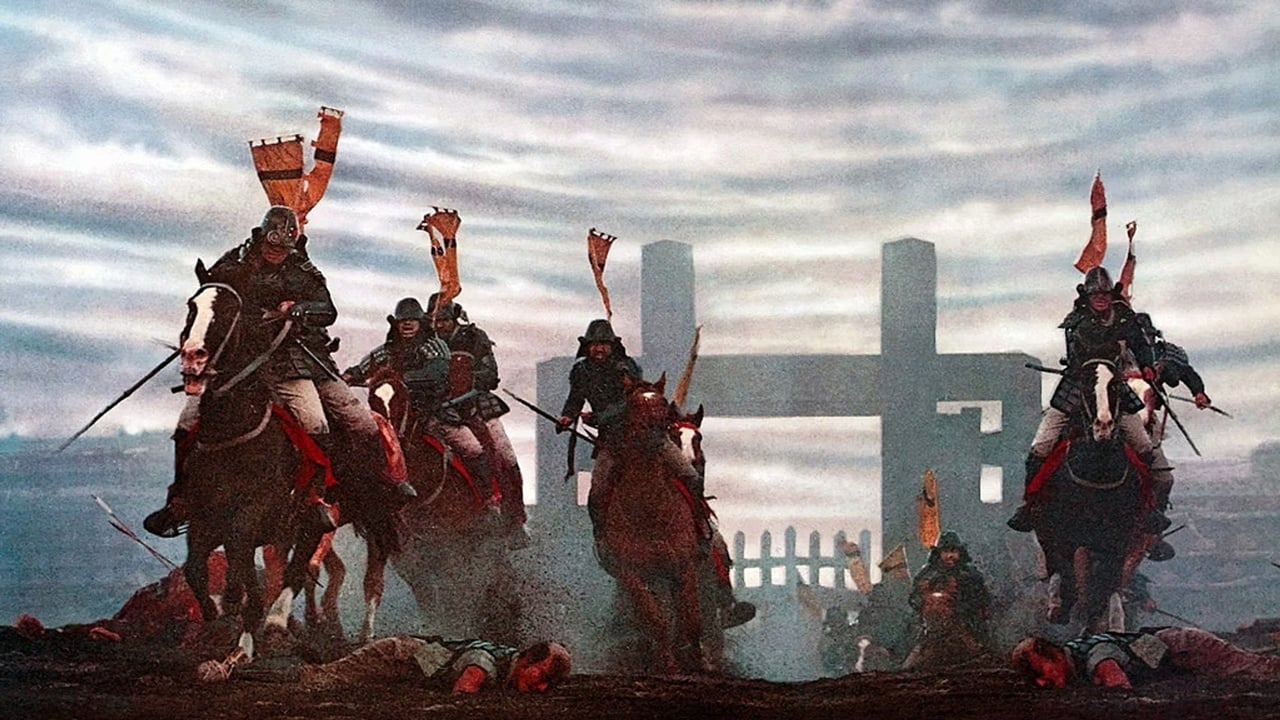
 Ran
— In a mad world, only the mad are sane.
Ran
— In a mad world, only the mad are sane.
Ran

Shakespeare's King Lear is reimagined as a singular historical epic set in sixteenth-century Japan where an aging warlord divides his kingdom between his three sons.

 Ran
— In a mad world, only the mad are sane.
Ran
— In a mad world, only the mad are sane.

Shakespeare's King Lear is reimagined as a singular historical epic set in sixteenth-century Japan where an aging warlord divides his kingdom between his three sons.
My son is now old enough that I could share this with him - rewatching it for the first time in nearly 40 years. A friend dragged me to see it in the cinema on or near its release and it was probably the film more than any other that got me to consider and seek out “art house” cinema. Delighted to see that it still holds up very well in the new Apple TV 4K remaster. I had forgotten that it isn’t simply a gorgeous re-telling of King Lear in a different setting, but a devastating blend of Lear, Macbeth and Kurosawa’s own storytelling - in many ways superior to its “source material”.
"Ran," directed by the masterful Akira Kurosawa, is more than just an adaptation of Shakespeare's "King Lear" set in feudal Japan. It's a profound meditation on power, chaos, and the tragic fallibility of human nature that grapples with philosophical concepts in a striking manner.
The film mirrors the nihilistic philosophy of Friedrich Nietzsche, who proposed that life is chaotic and devoid of any inherent meaning or morality. The title "Ran" translates to "chaos" or "revolt" - a fitting name for a narrative where trusted alliances shatter, sons turn against their father, and moral order spirals into anarchy. Like Nietzsche's affirmation of life in its chaotic state, characters in "Ran" must navigate their turbulent world, creating their own sense of order and meaning.
Further, Kurosawa's exploration of Lord Hidetora's fall from grace resonates strongly with the Aristotelian concept of "hamartia," or tragic flaw. Hidetora, a once powerful warlord, descends into madness and despair due to his hubris, painting a tragic picture of a man undone by his own pride and vanity. This is pure Aristotle - Hidetora is a tragic hero felled by his own internal weaknesses.
Furthermore, the theme of inevitability and predestined doom in "Ran" echoes the Stoic philosophy, which emphasizes the acceptance of fate. Hidetora's downfall and the destruction of his clan seem inevitable, a grim testament to the relentless march of fate that no amount of human struggle can prevent.
Finally, the film's examination of the nature of power and authority can be compared to Thomas Hobbes' social contract theory. The chaos that ensues upon Hidetora's abdication underscores Hobbes' idea of life in the "state of nature" as "nasty, brutish, and short."
In conclusion, "Ran" is a cinematic tour de force that masterfully intertwines epic storytelling with profound philosophical explorations. Its powerful depiction of human folly, chaos, and the unforgiving nature of fate is an experience that will leave you in contemplation long after the film has ended. Watch it for its grandeur, stay for its philosophical depth.
Incredible adaptation of Shakespeare's 'King Lear'. The cinematography and direction is mesmerizingly beautiful, contrasting the tragic tale.
Imagine you just commanded your army to charge into the forest for battle, and they get obliterated by guns, so you tell them to pull back obviously. Then, in another brilliant decision, you think about what just happened and are like "Well surely if we charge directly into enemy fire like we just did, the exact same outcome won't happen again." So you tell your soldiers to charge into the forest again, and to your shock, you see them get obliterated by guns, again.
Visually stunning movie. Especially the colors.
Such a beautiful movie. That scene when the soldiers run in to attack Hidetora. Red flags on black ground and white smoke. Amazing.
In a mad world, only the mad are sane.
But beauty colors the chaos...
Thank you for the recommendation as a couplet to the Fall (2006) w/Mari.
https://boxd.it/2xzWGH
Like a classic Cadillac, it's majestic and regal and takes a long time to get started.
For me, the most impressive thing about Ran is how it looks. The use of color is amazing and there are some awesome shots in this. Both come together in the battle sequence, which is the best this movie has to offer. The story, however, is just okay for me. I just don’t find all this infighting and revenge super interesting.
My son is now old enough that I could share this with him - rewatching it for the first time in nearly 40 years. A friend dragged me to see it in the cinema on or near its release and it was probably the film more than any other that got me to consider and seek out “art house” cinema. Delighted to see that it still holds up very well in the new Apple TV 4K remaster. I had forgotten that it isn’t simply a gorgeous re-telling of King Lear in a different setting, but a devastating blend of Lear, Macbeth and Kurosawa’s own storytelling - in many ways superior to its “source material”.